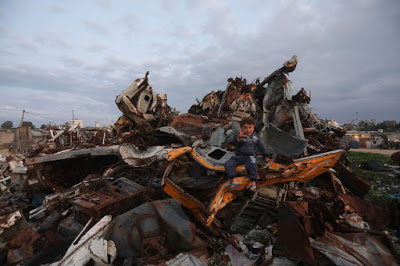In Gaza refugee camp, you would need a wizard’s wand to have a New Year’s celebration
 |
| Ahmad Kabariti – January 1, 2019 |
“I have not worn lipstick since my wedding ten years ago. So feeling happy in a Gaza refugee camp, you need a wizard’s wand to change this misery. What new year are you talking about bro?” said Samar Al-Atrash, 33, a mother of seven children living in Nahr al-Bared refugee camp in Khan Younis, on December 31, 2018.
As she moves through a 130-square-foot space in a dark tent, among dozens of ragged clothes and dented cooking pots, Samar does not even have the capability to celebrate the new year. She and her husband Esmaeel, 33, moved to the camp after they lost their house in the 2014 war on Gaza.

Samar Al-Atrash in Nahr al-Bared refugee camp in Gaza, Dec. 31, 2018. Photo by Mohammed Asad.
Samar feels “little happiness.” She does not have a dressing table mirror to reflect her exhausted face and she is still unaware of President Trump’s last August announcement that his administration would no longer fund the United Nations Relief and Works Agency for Palestine Refugees (UNRWA).
I asked Samar how her family and she might celebrate the new year. “Once I might be able to save some flour and vegetable oil from UNRWA aids to bake a pound cake, then I would invite the neighbors,” she replied as she cooked sorrel outside the tent.
And speaking of the UNRWA cut, she says: “If that really happens, it means real death.”

Samar Al-Atrash in Nahr al-Bared refugee camp in Gaza, Dec. 31, 2018. Photo by Mohammed Asad.
The 69-year-old agency provides services to about 5 million Palestinian refugees in Jordan, Lebanon, Syria and the West Bank and Gaza. Most are descendants of people who were driven out of their homes or fled the fighting in the 1948 war that led to Israel’s creation.
A few yards behind Samar’s tent, Nesreen Zourob, 28, was preparing spaghetti for her six children. Her husband Mahroos is stuck in Morocco. He sold his donkey cart for 1200 US dollars, but his money ran out before he could complete his plan to immigrate to Belgium, according to his wife.

Nesreen Zourob in Nahr al-Bared refugee camp in Gaza, Dec. 31, 2018. Photo by Mohammed Asad
Both Nesreen and Samar’s families are originally from the village of al-Muharraqa, five kilometers east of the fence that separates Gaza and Israel.
Nesreen moved to the camp in 2008 when she lost the ability to pay rent on an apartment in the adjacent city of Khan Younis in southern Gaza.

Nesreen Zourob with a picture of her husband Mahroos. In al-Bared refugee camp in Gaza, Dec. 31, 2018. Photo by Mohammed Asad
“2017, 2018 or even tomorrow [2019] are just days eating more health from us,” she says. “Getting out of this damned camp or reuniting with Mahroos, then I can say we can celebrate. But it seems one day I might hear he drowned in the sea dreaming of a good life in Europe instead being a refugee forever.”

Environs of Nahr al-Bared refugee camp in Gaza, Dec. 31, 2018. Photo by Mohammed Asad.
Gaza has always been poor, though conditions for the 2 million people who live in the crowded seaside territory have worsened as the numbers of unemployed laborers there reached 250,000 and poverty has reached 60 per cent of the population, according to local reports.
As for the upcoming general election in Israel in April, Nesreen says that it is merely “counting more wars and death to Gaza”. Benjamin Netanyahu, Avigdor Liberman, Ehud Barak, Ehud Olmert, and Ariel Sharon are all “dumps from the same mentality,” she says. “No one will give us roses, they just compete to kill.”

Abdulazeez Abu Sitta in Nahr al-Bared refugee camp in Gaza, Dec. 31, 2018. Photo by Mohammed Asad
While Abdulazeez Abu Sitta, 29, unemployed, felt compelled to spend the new year with his friends in the camp. He said he has no coins for a taxi fare to join the celebrations of the 54th anniversary of the founding of Fatah in conjunction with the new year, when a torch was to be ignited in the center of Gaza city.
Abdulazeez think the entire world is moving towards war. “I think we will miss the stable situations after the US moved its embassy to Jerusalem. That was just what Israel needs to get the green light, to eliminate the Palestinian issue,” he said.
Jehad Abu Muhsen, a 49-year-old mother of two, had just ended her daily routine by carrying crushed stones on a horse-drawn cart to a nearby stone crushing workshop, for $1.50 US for each load.

Cart that brought stones to a quarry for crushing, in Nahr al-Bared refugee camp in Gaza, Dec. 31, 2018. Photo by Mohammed Asad
“There is no beautiful or happy years here in the camp nor the whole Gaza,” Abu Muhsen told Mondoweiss. “This man [Trump] is going to spoil the world, while the biggest losers are us the Palestinians.”

Jehad Abu Muhsen in Nahr al-Bared refugee camp in Gaza, Dec. 31, 2018. Photo by Mohammed Asad
The Abu Muhsen family once owned a palace in Jaffa, with 40 dunums of lemon and orange orchards.
“Today I have a 140-square-foot space tent surrounded by high walls of waste and car wrecks,” she said. “Don’t forget to visit us in 2020, son, you might find us vanished. Or at least bring some flour for pound cake for the next new year.”


